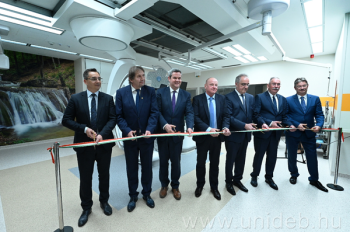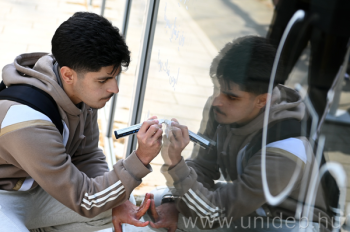- The management of the Clinical Center has made increased efforts to ensure that the institution is in the vanguard of the fight against coronavirus. This primarily means establishing diagnoses and cure for patients suffering from coronavirus, their post-COVID care as well as vaccination. In the third wave of the pandemic a level of activity greater than before is necessary, which has necessitated the remodelling of the entire therapeutic structure. These were the measures that laid the foundation for the outstanding results achieved in their fight against coronavirus, Zoltán Szabó, Head of the Clinical Center stressed.
The professor highlighted the fact that every single patient is given highest quality care in accordance with their condition on the two Debrecen campuses of Nagyerdő and Kenézy Gyula campus as well as in the Gróf Tisza István Hospital of Berettyóújfalu, whose professional supervision is also provided by the Clinical Center.
The National Hospital Directorate-General, the National Public Health Centre and the ministries provide all assistance. It is due to this that the Clinical Centre has all instrumental and infrastructural conditions at their disposal.
- The intensive units work with their constant teams of specialists, providing high-quality care 24/7. The ratio of successful treatments in our intensive care units is outstanding both by Hungarian and international standards. Emergency surgery interventions as well as oncology surgeries continue to take place, ensured by appropriate background, explained Professor Béla Fülesdi, Director of the Anesthesiology and Intensive Care Clinic.
In the Clinical Center infected patients are treated with special anti-virus medications from the very beginning.
- In Hungary we were the first to use Avigan, with the active agent favipiravir, which inhibits proliferation of the coronavirus, reduces the number of coronaviruses, thereby potentially preventing severe disease. We were also first to use remdesivir in Hungary. The highest number of successful treatments with favipiravir and remdesivir has taken place at the Clinical Center of the University of Debrecen so far. We were also involved in the development of Hungarian-produced favipiravir and remdesivir, too. As partners in international research projects, we were the first to use treatment with monoclonal antitests, which is known to prevent severe disease within seven days of an infection, and can thus be life-saving. We have also used bamlanivimab, tocilizumab and berinert as the most modern therapeutic tools of the fight against coronavirus, said István Várkonyi, Director of the Clinic of Infectology.
Due to the continuous rise in the number of patients, bed capacity was expanded in accordance with needs. In the third wave of the pandemic Section 2 of the Epidemiology Care Centre was opened on the Nagyerdei Campus, as part of which the Clinic of Rehabilitation and Physical Medicine provides care primarily for patients with severe condition, in need of intensive therapy (ventilation and ventilatory support). Further COVID wards were formed in the clinics of Orthopedics, Pulmonology, and Dermatology in order to ensure continuous and high-quality treatment.
- Appropriate infrastructural background, ever-increasing knowledge, treatment options, and professional guidelines enable high-quality care, said associate professor Zsófia Miltényi, in charge of logistics at Section 2 of the Epidemiology Care Centre.
The epidemiological situation requires special tasks from health care workers, too. At present some 1.000 people are involved in COVID care.
- Increased workload and the special needs that occurred during care required us to strengthen the number of health workers. There is ongoing re-grouping of human resources on both campuses of the Clinical Center to meet needs and comply with the conditions of safe patient care, explained Mária Gál, director for care and health workers of the Clinical Center.
To ensure efficient treatment for patients with coronavirus high-quality and fast diagnostics, including imaging, chest X-ray, and chest CT, is indispensable. Due to the considerable developments of recent times, high-quality and fast imaging diagnostic background is available on both campuses of the Clinical Center when needed. In addition, lab diagnostics is of utmost importance as the worsening of the pandemic requires a higher and higher number of tests and examinations.
- At present a daily total of 1200-1600 COVID-PCR- tests are performed in the Clinical Center, the results of which are available on the day of the test or the next day at the latest. Also, since January, there have been routine COVID-serology tests, which show previous exposure to the coronavirus or the occurrence of antibodies following the administration of the vaccine, added János Kappelmayer, Director of the Institute of Laboratory Medicine.
The Clinical Center also provides treatment for patients who have undergone a Covid infection but are still suffering from its symptoms. The Post-Covid Outpatient Network created specifically to provide care to these patients carry out the examination, care and rehabilitation of patients relying on work by infectologists, pediatricians, cardiologists, internists, pulmonologists, rheumatologists, immunologists, neurologist, ear-nose-and throat specialists, psychiatrists and clinical psychologists, based on the guidelines of the Ministry of Human Resources. Based on patients’ complaints, the general practitioner refers them to the network, where they can be treated by more than one specialist.
- There is a growing interest in this special form of care and the number of patients treated is also on the increase. The specialists and health workers working in the Outpatient Network exchange experience during regular consultations to ensure patients’ fastest cure possible in the Clinical Center. Their results and observations may enable further conclusions to be drawn, stressed Mária Papp, deputy head of the Clinical Center.
The Clinical Center of the University of Debrecen takes a notable part in vaccination, too. They continuously develop vaccination activity and increase the number of vaccination points as required by the National Hospital Directorate-General, and the National Public Health Centre.
Press Office


